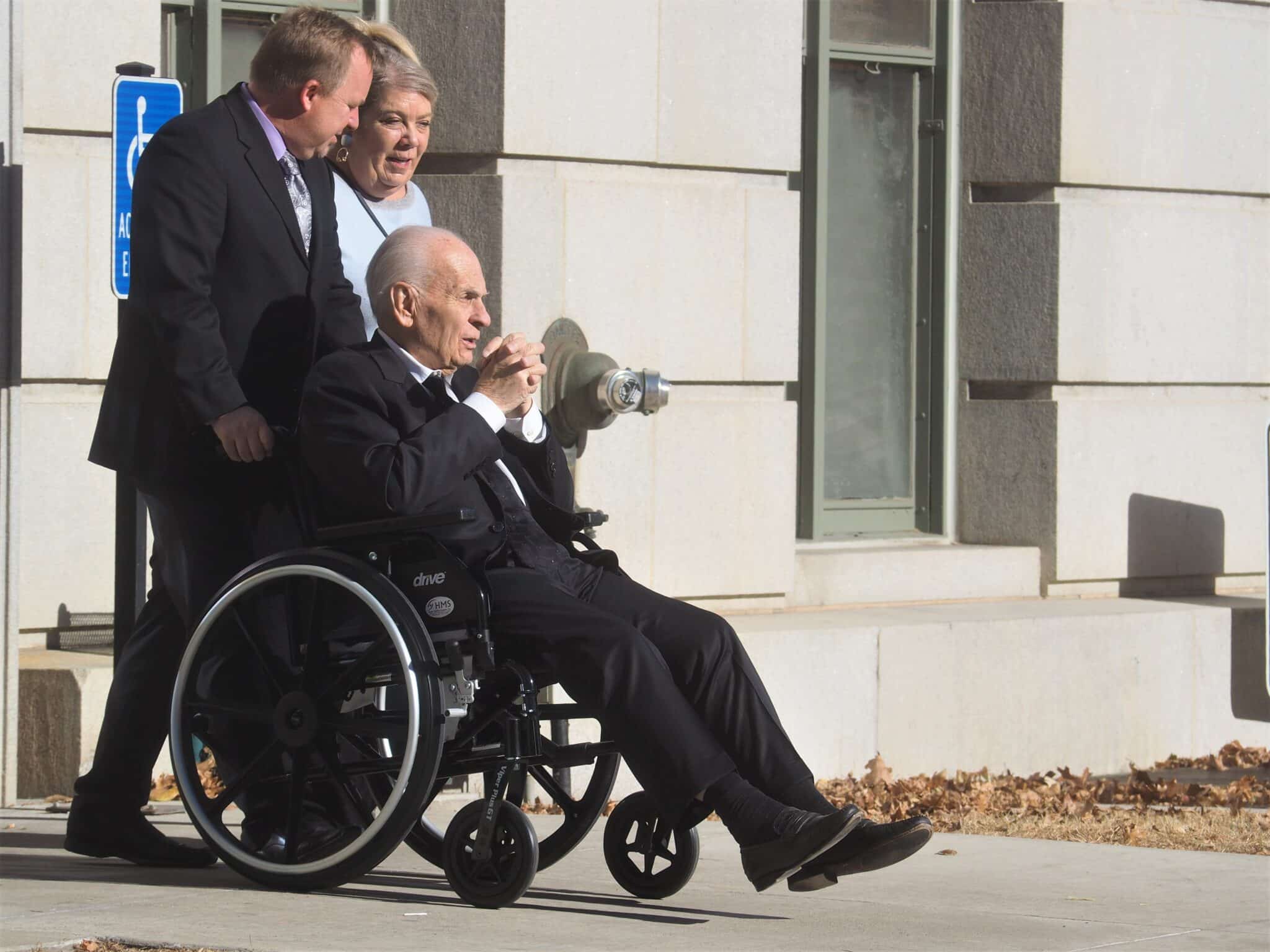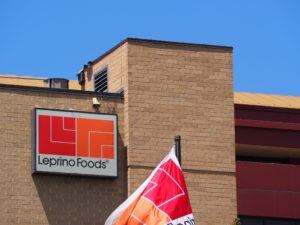
Leprino Foods CEO James Leprino leaves the Denver City and County Building on Wednesday, Dec. 7, 2022. (BusinessDen file)
A family legal drama that began six years ago, when the billionaire mozzarella magnate James Leprino told two nieces who had fallen out of his favor that their shares in the family company were worthless, has concluded in Leprino’s favor.
On Aug. 19, the Colorado Supreme Court announced it would not consider an appeal from one of the nieces, Nancy Leprino, bringing the headline-grabbing case to a quiet close. The state’s high court is the third legal panel to consider the matter and side with James Leprino.
“We are pleased with the decision of the Colorado Supreme Court, as well as the decisions of the jury and the prior courts,” said Michael Hofmann, a lawyer for the octogenarian.
Sean Connelly, an attorney for Nancy Leprino, declined to comment on the conclusion.
James Leprino’s father was an Italian immigrant who ran a small grocery store in Sunnyside until 1958, when large grocers put it out of business. James Leprino then turned Leprino Foods into a cheese company with an emphasis on pizza cheese. Leprino Foods now dominates the U.S. pizza cheese market and is the largest mozzarella producer in the world.
The company remains based in Sunnyside and family-owned. James Leprino and his children control 75 percent of Leprino Foods. The other 25 percent is owned by the three daughters of Mike Leprino, James’ brother who died in 2018.
In the years before his death, James Leprino feuded with his brother, who he believed had cheated him in business. So, James and his children removed Mike from the board of Leprino Foods and later limited his daughters’ roles with the company after Mike’s death.
The dispute came to a head when, in 2018, James Leprino told his nieces to tell the Internal Revenue Service that their stock in Leprino Foods was worth zero dollars. Because the stock can’t be traded and Leprino had decided to stop paying out dividends, the shares were worthless, he told his brother’s daughters, despite a valuation of $340 million.
Two of the three nieces, Nancy and Mary Leprino, sued their uncle and Leprino Foods in 2020, accusing them of rendering their shares worthless. They called for the company to be dissolved and asked jurors to award them at least $600 million during a 10-day trial.
“After your brother died, you told your nieces that their stock was worth zero. Isn’t that true, sir?” James Leprino was asked in a deposition video that was played at the trial.
“Yes,” the Leprino Foods CEO said.
Attorneys for James Leprino and Leprino Foods acknowledged that their client had called the shares worthless but argued they were not actually worthless. They noted that Mike Leprino and his daughters had received $135 million in dividend payments in 2017 and tens of millions of dollars each year between 2013 and 2016 — proof that their stock had value.
Jurors sided with James Leprino and Leprino Foods. When Nancy Leprino — but not her sister Mary — appealed their verdict to the Colorado Court of Appeals, it also ruled against her, finding that “no one — and certainly not the plaintiffs — actually believed the shares were worthless” and that James Leprino’s “declaration that the shares are worthless does not make them so.”
Nancy Leprino tried appealing that ruling to the Supreme Court, which declined to hear it.

Leprino Foods CEO James Leprino leaves the Denver City and County Building on Wednesday, Dec. 7, 2022. (BusinessDen file)
A family legal drama that began six years ago, when the billionaire mozzarella magnate James Leprino told two nieces who had fallen out of his favor that their shares in the family company were worthless, has concluded in Leprino’s favor.
On Aug. 19, the Colorado Supreme Court announced it would not consider an appeal from one of the nieces, Nancy Leprino, bringing the headline-grabbing case to a quiet close. The state’s high court is the third legal panel to consider the matter and side with James Leprino.
“We are pleased with the decision of the Colorado Supreme Court, as well as the decisions of the jury and the prior courts,” said Michael Hofmann, a lawyer for the octogenarian.
Sean Connelly, an attorney for Nancy Leprino, declined to comment on the conclusion.
James Leprino’s father was an Italian immigrant who ran a small grocery store in Sunnyside until 1958, when large grocers put it out of business. James Leprino then turned Leprino Foods into a cheese company with an emphasis on pizza cheese. Leprino Foods now dominates the U.S. pizza cheese market and is the largest mozzarella producer in the world.
The company remains based in Sunnyside and family-owned. James Leprino and his children control 75 percent of Leprino Foods. The other 25 percent is owned by the three daughters of Mike Leprino, James’ brother who died in 2018.
In the years before his death, James Leprino feuded with his brother, who he believed had cheated him in business. So, James and his children removed Mike from the board of Leprino Foods and later limited his daughters’ roles with the company after Mike’s death.
The dispute came to a head when, in 2018, James Leprino told his nieces to tell the Internal Revenue Service that their stock in Leprino Foods was worth zero dollars. Because the stock can’t be traded and Leprino had decided to stop paying out dividends, the shares were worthless, he told his brother’s daughters, despite a valuation of $340 million.
Two of the three nieces, Nancy and Mary Leprino, sued their uncle and Leprino Foods in 2020, accusing them of rendering their shares worthless. They called for the company to be dissolved and asked jurors to award them at least $600 million during a 10-day trial.
“After your brother died, you told your nieces that their stock was worth zero. Isn’t that true, sir?” James Leprino was asked in a deposition video that was played at the trial.
“Yes,” the Leprino Foods CEO said.
Attorneys for James Leprino and Leprino Foods acknowledged that their client had called the shares worthless but argued they were not actually worthless. They noted that Mike Leprino and his daughters had received $135 million in dividend payments in 2017 and tens of millions of dollars each year between 2013 and 2016 — proof that their stock had value.
Jurors sided with James Leprino and Leprino Foods. When Nancy Leprino — but not her sister Mary — appealed their verdict to the Colorado Court of Appeals, it also ruled against her, finding that “no one — and certainly not the plaintiffs — actually believed the shares were worthless” and that James Leprino’s “declaration that the shares are worthless does not make them so.”
Nancy Leprino tried appealing that ruling to the Supreme Court, which declined to hear it.

